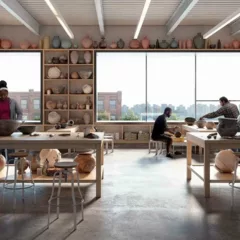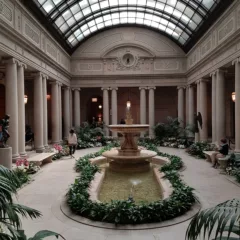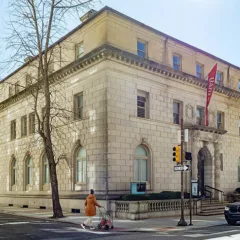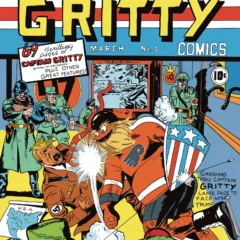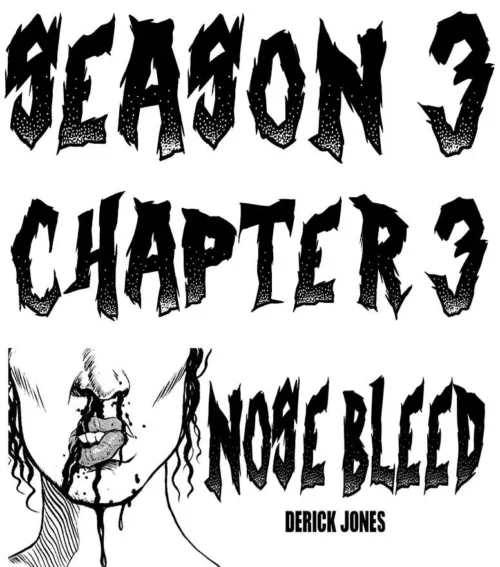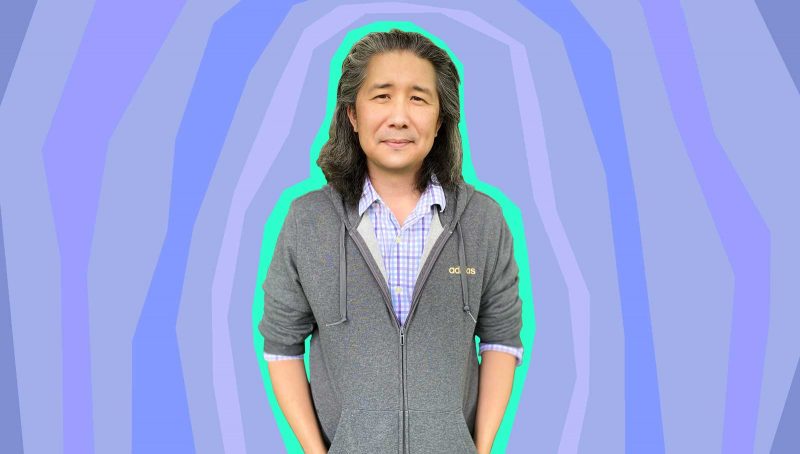
In this 33 minute Artblog Radio interview, Roberta and Bryan Warner talk about a wide range of subjects, from his upbringing with a Japanese mother who took him to Buddhist Temple growing up; to his work after art school, teaching, first as a college adjunct and now teaching art in an elementary school. Bryan is prolific in his art making and is filled with questioning and an open mind as he makes art. You can see his work now until June 19 in a group show at MK Apothecary in Collingswood, NJ.
This interview is available as an Artblog Radio audio podcast, here (above), and on Spotify and Apple Podcasts; video, here (below), and on Youtube (with subtitles and slides of Bryan’s art); and text transcription, here (below).
‘GARBAGE,’ a themed group exhibition, on view now until June 19, 2021, at MK Apothecary (IG: @mkapothecary). You can find Bryan on Instagram @thequietpaintbrush or on his website thequietpaintbrush.com.
You can listen to Artblog Radio on Apple Podcasts and Spotify. Thank you to Kyle McKay for composing Artblog Radio’s original podcast intro and outro!
Video
Transcription
Roberta Fallon: [00:00:12] Hi, everybody. Welcome to another episode of Artblog Radio. I’m glad you can join us today. I’m Roberta, and today I’m speaking with Bryan Warner, artist and educator located in South Jersey. Hi Bryan!
Bryan Warner: [00:00:27] Hi Roberta!
Roberta Fallon: [00:00:29] Hope you’re good today. Are you good at the Monday? Mondays are not always a good day for most people.
Bryan Warner: [00:00:35] Doing well.
Roberta Fallon: [00:00:36] I’m glad. Okay. So a little bit of background. I met Bryan recently in the online First Thursday Venture Cafe series, where we had a very nice conversation in spite of being an online platform, which, you know, everybody knocks, but you can actually sometimes have a really good conversation. And we did. Bryan is a prolific painter of complex and beautiful works that you can see on his Instagram, @thequietpaintbrush, or at his website, thequietpaintbrush.com.
Bryan. Your works are incredibly multilayered. There seem to be macro and micro layers, but every work seems stuffed to the gills with objects, lines, and like, internalized thought bubbles, you know, in comics? Uh, maybe when you’ve had too much coffee and your brain is on overdrive and you’re thinking 15 thoughts a second. And you know, is that what it feels like to you?
Bryan Warner: [00:01:44] Um, no. (Bryan and Roberta laugh) When I do it, when I do it, I’m, I feel really calm and it’s kind of like, like making art is, is the place that I kind of decompress. So when I’m making the work, it’s almost like, I feel like I’m meditating, but I think just in general, my mind kind of works super fast. And I think it’s just like subconsciously that’s, it’s my thoughts are just kind of like blowing out of my brain.
Um, so maybe I’m like kind of like detoxing my brain when I make art. And that maybe that’s what you’re seeing. Um, it’s yeah, just kind of like my brain unfiltered in some, in some way.
Roberta Fallon: [00:02:26] I love “detoxing my brain.”
I think that’s really maybe what a lot of artists do, um, or aspire to doing. I think it’s when you get in trouble, when you get in trouble, it’s when you’re too conscious of your brain, you know, your brain can get in the way of your art. Sometimes in a good way and sometimes in a not good way.
Bryan Warner: [00:02:50] Yeah, no, I, I, um, when I first started making art, I tended to try and think of the idea first and then make the art, but it always felt like, kind of like a bleeding, like I was like, like, you know, like, really like suffering, like trying to get blood from a stone or something. Um, so I’ve tried to like be less self-conscious about it and let it happen. Like get out of the way. Um, like there’s that quote by Philip Guston, where he talks about in his studio, there’s like lots of people when he first starts making work. And then slowly, the people kind of like walk away and then it’s just him. And then it’s just the work.
Um, so like that’s sort of something that I aspire to. It’s like, I want, I want to get kind of like sucked into the work or lost in the work. Um, there’s like a Japanese term for it too. They say, um, mushin, which is like it, the direct translation is “no mind.” um, which sounds kind of, it’s like, Oh no mind, you’re not thinking. But I guess like a better translation is maybe like “one mind” where it’s like super focused, almost like you forget that you’re there. Um, so yeah, that’s something that I kind of aspire to in the work. That’s a good day. If I get to that point.
Roberta Fallon: [00:04:09] That’s great. Can I ask how long it takes you to make a piece you, if, if a person scrolls through your very fertile Instagram feed and sees all these images? Um, I’m one of the questions that will come up for me is, gosh, I wonder how long it takes to make one of these. They’re so complicated.
Bryan Warner: [00:04:31] Uh, yeah. So right now, like the most recent stuff that I’ve been doing, which is like the kind of coloring book, a real, like, they look like cartoon images that are kind of like painted in a sorta, maybe abstract expressionist style.
Um, those, it. It’s hard to say. Cause I, I kind of pick them up and I put them down. So I have like six or seven or so going at the same time. And I’ll just kind of like draw lines and, and paint and let it dry and then move on to another one. So it’s almost like cooking a bunch of meals at the same time, like cooking the mashed potatoes and cooking the meatloaf and cooking the broccoli. Um, so it’s sort of all happening.
If I’m doing one, like the oil paintings that I do that I, I, you know, like the still life oil paintings, those like I could do, I can do one in a day. Like I, I try to, I try to, ideally it would be like one day, like put down the, the layer and then paint into it and then try and finish it in that one sitting, um, like, like Luc Tuymans. I, I really admire his work too. And I like that sort of stipulation that he sets on himself that he tries to make the painting in one day.
Um, I, for me, I feel like that kind of takes away the self-consciousness of it, like fussing over, making the perfect painting and just making the work that you can make. And then kind of just addressing that, like, You know, if I, if I had my, my, if I let it happen, I would probably hold on to it and keep working on it and keep working on it and keep working on it. Um, just because of like self doubts and things. So I try to find ways to, to stop that, you know, like kind of, kind of, um, put obstacles in front of my self doubt, I guess.
Roberta Fallon: [00:06:35] Yeah, it strikes me that it’s also going against the nature of the material when you, or at least traditionally the way oil painting has been thought of it’s a, could be a month long process where you do it slowly and you build up the layers over time and it’s like, no, we’re going to do it in one day.
Bryan Warner: [00:06:59] Yeah. Yeah. Well, yeah, like, like the, the oil paintings when I’m doing that, like, I’m thinking of like Tuymans, but also like Van Gogh where, you know, like he, he would sometimes paint, you know, in a sitting. So, you know, like thinking about, you know, like, yeah, just, just putting that kind of constraint on myself, like painting alla prima.
Um, and that that’s not something that I’ve always done, but it’s something that I’ve kind of worked into. As, uh, a solution or a kind of work around to kind of deal with that, that insecurity I have about making a perfect image or, um, you know, something like that.
And I should say also that the, the work that I’m making now is not oil. So it it’s, I don’t have to wait for that, that kind of drawing. So I can do a lot of layers. So I’m working in acrylic and, you know, like I can do a lot of layers and still, um, do it rather relatively quickly. I don’t have to wait for the drawing, um, like a, like an old master would have to.
Roberta Fallon: [00:08:06] Yeah. Well, let’s talk about, uh, you’ve mentioned your imagery just in passing the, uh, comic book or, um, what did you call them? Coloring book images.
So are you appropriating images from comic books? And what kind of comic books do you have that you’re appropriating from?
Bryan Warner: [00:08:28] So I, I use a lot of like comic books and coloring books, um, in the past, you know, like comic books, like G.I. Joe and like things from my childhood that I remember, like, um, a lot of like eighties comic books, I, I go to stores like vintage stores and try and find old comic books.
Um, just cause it feels like a kind of time capsule. So like G.I. Joe and DuckTales and things like that. And right now I’m using a lot of My Little Pony and, um, Lisa Frank, do you know Lisa Frank? Oh yes. Yeah. Sometimes I say Lisa Frank and people, they give me a blank stare, but, um, yeah.
So like how, like, this is like one of the, My Little Pony one, which I just really, I find the lines really interesting. And. The forums, like the forms are very open and there’s a lot, I feel like you can put a lot into the form and then the Lisa Frank they’re, I’m sorry, like they’re like kitschy and cute to the point of being grotesque. Like there’s just something very odd. Like it’s so sweet and saccharin that it becomes almost like horrific, like try and find one like this it’s like cat on top of a dog.
You know, in the rain, um, just like I, like, I like this the way that the forms kind of like melt together. Um, yeah, it kind of makes this new, new, weird shape. Um, so that those are, I sort of start with that as a drawing. And, you know, typically I’ll use like a permanent marker because I can’t fix it. And then I just kinda like, that’s the drawing and then I start painting it and then I, you know, add to it and kind of. Try and make it something else. Like it starts as this kind of key thing. And then I see like, you know, what happens if I make it more kitschy, or what makes, you know, can I make it less kitschy and more like, you know, give it like, uh, a kind of emotional mood, like a, you know, like a, a more serious or higher, you know, like, more complicated emotion?
Roberta Fallon: [00:10:42] Spiritual! You’re going for spiritual Lisa Frank.
Bryan Warner: [00:10:45] (Bryan and Roberta laugh) It might be! Like somewhere between Rothko and Lisa Frank, you know? Maybe I’ll fall down in the middle there.
These are images that are coming from the coloring books. And then I usually will take pieces of different pages and kind of put them together. And then again, like try to make something new.
And one of the things that I’m kind of thinking about is, um, like the titles, a lot of times they’re like cliches. So. I kind of, I’m interested in like cliches as, uh, like how that acts as communication? So like a lot of, I used to get really upset when people would like, use like platitudes and cliches. And I was like, Oh, well, why can’t they just come up with their own? You know, why can’t they just say something meaningful?
But then I started thinking like, well, what, why? You know, like I do it too. And it’s like, why do I do it? Like. What does that say? You know, like, is it like, is it something that happens when you have no, like, it’s such a complicated situation that you have no words, you know, like when people say unprecedented right now, I feel like it’s like, that’s like the word that you hear all the time. It’s like, it’s unprecedented. And then it’s kind of like, well, I’m tired of hearing that word, but at the same time, it’s like, well, what else am I going to say? Like, You know? Like how do you, how do you wrap words around the enormity of this, you know, this thing that we’re going through and all this stuff like yeah. So.
Roberta Fallon: [00:12:23] You’re having a battle with cliches and whether or not you like them and spurn them.
Bryan Warner: [00:12:31] Yeah, I, yeah, I guess, or like, maybe I’m like trying to, trying to figure out why .I, like, why do I dislike them? Like challenge that, that initial reaction that I have to them, um, you know, just kinda like question, what, what does it mean for me? Uh, and then maybe what does it mean for other people too?
So, yeah, and yeah, I don’t know, like, like, I think about how we use sort of like pre crafted language and symbols, like emojis and. Um, memes and things like that. And they become this kind of stand in that, you know, we used to like communicate with, with people.
Um, so yeah, I, I’m kinda curious about that. So yeah.
Roberta Fallon: [00:13:18] Yeah. Do you think it has anything to do with labeling it? It seems to me, humans are. Natural labelers. It helps us demystify the world. It’s a bad thing, but in some respects we have to do it. It’s the only way we can deal with our world. Um…
Bryan Warner: [00:13:37] Yeah. Yeah. I, Oh yeah. Like with labels, like labels can, you know, I can definitely see them as being, you know, like problematic, but at the same time, it’s like, They like with art, you know, like when you have art and you have like that desire to put labels, like this is, you know, abstract expressionism, or this is surrealism. And then it becomes fun to say, well, well, why doesn’t like, this looks like surrealism, but why doesn’t it fit?
You know, like, so then art, I feel like artists can kind of play with the labels, um, and make something really interesting. Um, or like mix them together. Like what happens when you make an abstract expressionists pop art painting? Or something like that.
Roberta Fallon: [00:14:20] (Roberta laughs) I love that!
Bryan Warner: [00:14:21] Yeah.
Roberta Fallon: [00:14:22] You got to try that. Well, we’re talking about words now, and I can see your, you are clearly a wordsmith and you are very interested in words, in addition to art.
So let’s talk now about The Quiet Paintbrush. That’s a terminology. I don’t know if it’s unique to you. Did you coin that phrase?
Bryan Warner: [00:14:43] Um, I, I, I… I didn’t see it ahead of time. I don’t know if I can take full credit for it. I don’t know if there’s somebody else that uses that. But yeah, I was just kind of thinking about like a, uh, sort of name for my website and the name for myself on Instagram.
Um, cause there’s, there’s Bryan Warner’s in the world. Um, like, I don’t know if you know this, but Marilyn Manson. Do you remember Marilyn Manson?
Roberta Fallon: [00:15:11] Sure!
Bryan Warner: [00:15:12] His name is Bryan Warner. So. Like, and he’s actually a painter too, so yeah. So like to call, like to say Bryan Warner, (Roberta laughs) yeah. I don’t know. There’s just baggage.
So I figured I’ll, I’ll come up with a different name. Um, so yeah, The Quiet Paintbrush it’s it’s I guess that’s like my self-image like, I’m kind of, I feel like I’m a quiet, kind of a quiet person. I’m sort of soft-spoken and my default is to not talk a lot. Like if I…
I can kind of press myself and become more talkative, but, um, given my, you know, left to my own devices, I will just sort of sit quietly and think about the world and, you know, ponder under what’s happening.
Um, and then, you know, I just see, I kind of picture myself as a paintbrush that just kind of quietly eats away and, you know, sort of melts into the, into the paper.
Roberta Fallon: [00:16:12] Okay. Um, I will mention though, you’re not a monk in a cave and you are an elementary school teacher at the moment. So I think a lot of words are coming out of your mouth these days. (Roberta laughs)
Bryan Warner: [00:16:26] Yes, yes, yes. Sometimes the same word over and over, (Roberta laughs) depending on, depending on how things are going. Um, but yeah. Yeah. It’s. You know, in, yeah. I definitely talk more when I’m in, in class and there’s like, uh, you know, I have to put on a show to a certain extent, but yeah, I, I guess in general, I’m, I’m a quiet person, so,
Roberta Fallon: [00:16:51] Well, let’s talk about teaching and get into that a little bit.
You told me that you used to teach adjunct to college students for about 10 years, and then you just gave that up. It was like, Been there done that. So talk, talk to me about that story a little bit and how you wound up teaching elementary school.
Bryan Warner: [00:17:13] Yeah. Yeah. I, I taught, um, as an adjunct for, you know, like, I, I hadn’t done a lot of teaching before.
Um, I went to grad school and part of our, like the scholarship was to teach. So I taught and I, I actually liked it. So I was like, Oh, this is cool. So I started teaching after school and. That, you know, as an adjunct, it was, it was a grind. Like it was, it was hard. Like I would teach, you know, maybe four or five classes a semester.
And then I also would work, um, as like a banquet service. So I would do like catering on the weekends and eventually it just kind of, it caught up with me like my body, um, you know, like just health wise. Like I wasn’t able to like maintain that kind of a, um, a schedule. And I needed something that was more stable, like after my daughter was born, um, you know, I just kinda decided I needed something different and I still liked teaching and being around my daughter, I realized that, you know, like little kids are fun.
So I thought, well, maybe I’ll try elementary school. Like I went and got my certification to teach elementary school and. Now. Yeah. Like it feels I, I made the right choice. Like I, I, um, yeah, it’s sometimes I think to myself, like, I can’t believe they’re paying me to do this. Like, you know, I get to make art.
I get to make art with kids and, you know, they they’re. Yeah. It’s just amazing. So,
Roberta Fallon: [00:18:44] How’s it been this year though? I would think it’s just, it’s very frustrating and trying, cause you’re not really with them, with them, making art?
Bryan Warner: [00:18:53] Yeah. Yeah. It, it, it’s hard. Like there’s in the beginning, we were all remote where I teach.
So like all the kids were on the screen and that was hard, but I started to feel like, um, you know, like there were advantages to it, like. You know, like I could have everybody share their artwork and we could do that in like five or 10 minutes. So everybody had a chance to like show off what they were doing, but then also, you know, like there’s things where, you know, like little things, like if, if a kid is.
You know, like if they need help and they’re kind of getting frustrated, you know, I can kind of like quietly go over and help them. Whereas now if someone needs help, I have to say, Hey, you know, Hey Johnny, let’s look at me. And then everybody’s kind of like, Oh, what what’s going on? So it’s that kind of like subtle part of it is sort of lost.
Um, so that was, that was hard. And that’s still hard. Like, you know, like I now we’re, we are hybrid. So we have kids in the classroom, like. Between 10 and maybe 10 and 15, 10 and 17 kids in the classroom. And then we still have some kids who are at home that are remote. So there’s like a little bit of juggling, um, involved with that.
Roberta Fallon: [00:20:08] Are you remote?
Bryan Warner: [00:20:10] So I, I will be in the classroom, so I go into the classroom, so we’re on a cart. So we push our carts to each classroom and I bring my art materials. Um, it’s funny, like I have all these, like, Like every week I come up with a new idea to like, get the class started. So like, I started to like make a video and I’ll like, give the directions as a video.
And I run around the room and I give everybody their art supplies and then we clean up and we, we play a game so that we can play clean up as fast as possible. And, um, and then I go over to the next class. So yeah, it’s like a little, like a little clown car circus thing where my cart just like (Roberta laughs) I unload lots of things. And there’s more and more art supplies coming out.
Um, but it’s, it’s, it’s nice to, to be with the kids and, you know, like to get, to see them and have that, that kind of like energy, you know, like the, feel, the energy of people. Um, that’s fun. Aye.
Roberta Fallon: [00:21:09] Aye. And that would be so different than teaching a college class. That energy, that energy is just, you want to bottle it and…
Bryan Warner: [00:21:21] Yes. Yes. Yeah, yeah, definitely. That’s uh, that’s probably the biggest difference.
Roberta Fallon: [00:21:28] Um, well, let’s turn to you now. Let’s talk about you. You’re now in South Jersey. Is that where you’re from originally where you grew up?
Bryan Warner: [00:21:37] Yeah, I was born in Bridgeton, New Jersey, and then, um, I grew up in Vineland, so there, you know, that’s kind of like in between Philadelphia and, uh, Atlantic city, um, bought a forms, um, you know, kind of a quiet area. Um, not, yeah…
Roberta Fallon: [00:22:03] And did you know right from, I dunno, an early age that you wanted to do art that’s what made you happy?
Bryan Warner: [00:22:11] Um, not, not necessarily. No. Like I, I made, I made art. Um, like I, I remember enjoying art class and I would draw all things and stuff like that.
Um, but I didn’t really picture myself as an artist. It wasn’t something like, I didn’t really understand that as a thing that people did, like, it was more like something, something to do it wasn’t like, I never necessarily viewed that as a, like a profession or a. Um, yeah.
Roberta Fallon: [00:22:48] Interesting.
Bryan Warner: [00:22:49] Yeah.
Roberta Fallon: [00:22:50] So when did, when did you decide, was it in like high school?
Bryan Warner: [00:22:54] Uh, well, I didn’t, I don’t think I like, I, I started pursuing art classes in college. Like I, you know, I did a lot of, lots of different classes and then I took an art class and then I really liked that. And I started, I said, well, I’m going to do this. Like, this is like my art major. But I don’t, I don’t feel like I felt like an artist until a long time.
Like, I feel like only within the last five years that I feel like, I feel like an artist, like, like, like I would tell myself, I would tell people like, Oh yeah, I’m an artist. Um, and part of it, I think is that I, that, that idea of like, when we were talking about like getting out of your own way, like, I always felt like, like when I was making art, I was trying to prove something. And then when I stopped feeling like I had to prove something to other people when I was making art. That’s when I started to feel like an artist. Um, if that makes sense, like,
Roberta Fallon: [00:23:53] Oh yeah.
Bryan Warner: [00:23:54] Yeah. Like I had to just kind of prove it to myself, I guess. Yeah.
Roberta Fallon: [00:24:00] It’s almost like labeling getting back to labeling. You’re labeling yourself. So you, it took you awhile to get to that label.
Bryan Warner: [00:24:08] Yeah.
Roberta Fallon: [00:24:08] But then it was something you wanted.
Bryan Warner: [00:24:12] Yes. Yes.
Roberta Fallon: [00:24:14] So, um, all right, let’s talk about materials. Now. You are a person that uses many, many materials in your artworks. So generally speaking, I think of people who gravitate to lots of different materials as having either some parental workshop around that they grow up kind of banging nails and feeling wood and that sort of thing, or having some other very early experience with messing around because materials are messy. Right?
Bryan Warner: [00:24:49] Yeah.
Roberta Fallon: [00:24:50] So did you?
Bryan Warner: [00:24:54] I don’t know! (Roberta laughs) Like my, my, my mom. Always sewed. So she, she was like big into selling. Like she would sew our costumes and, you know, make all kinds of things with her sewing machine. And I have memories of like hearing the sound of a sewing machine at night to fall asleep.
So, you know, like the, a lot of the sculptural things I make has been with a sewing machine. Um, so it was kind of like a, like a personal, you know, like a childhood connection that I was making. Um, and my dad he’s pretty handy. Like he would like, you know, like change the oil in this car and build things, you know, like if we needed to fix something in the house, he would, he would fix it. Um, so I guess that it was more of like, like that was something that you did was you fix things and you made things and you put things together as just part of life.
Um, so yeah, that’s maybe where that comes from is. Like the, the, the problem solving, you know, like that, that feels interesting to me is like, like I want to build this thing. How do I do it? You know, what’s the material. Um, and then like, for a lot of the sculptures, when I was making sculpture, I, I haven’t done much lately, but like a lot of times the sculptures come about, because I like the, the ideas that come with the materials.
So like, you know, like thinking about, you know, using cardboard and how cardboard could be like a disposable thing or, you know, like sewing plastic bags together and thinking about the different connotations that a person might have when they see plastic bags and they’re sort of these disposable things, but they also kind of could last forever because they’re plastic and, um, you know, they’re kind of containers, but you know, when I’m using them, they’re not containing anything. They’re just kind of holding emptiness, I guess.
Um, so yeah, a lot of times the sculptures are heavy, heavy on idea, you know, heavy on an idea. Whereas with painting, I feel like I’m painting to an idea. Um, like I don’t really know what I’m doing when I’m painting. I feel like the ideas sort of happen. They’re like sort of stream of consciousness, maybe?
Roberta Fallon: [00:27:23] That’s so interesting. It’s almost like a, you need a pattern when you’re making something three-dimensional, you know, which is a kind of three-dimensional thing. People who, so do use patterns and carpenters use all kinds of measurements and, and plans.
Bryan Warner: [00:27:41] Yeah. Yeah. No, that’s a great way of, that’s a great way of putting it.
Roberta Fallon: [00:27:47] Well, I we’re kinda running out of time here, but I do you want to get to your cultural background. Because you have, you’ve told me that you’re half Japanese. So I want to hear more about that. Have you been to Japan. And did you grow up there? Or no.
Bryan Warner: [00:28:08] No. So yeah, my mom is Japanese. She came to the United States in her twenties. Um, and. And she left her family in Japan. So her mom and her brothers, they all live in Japan. I’ve been to Japan. I want to say four times and three that I can remember. So I went once when I was a tiny baby and then three other times when I was like, uh, a person that can remember things.
Um, so yeah, I, yeah, I, I really liked Japanese culture. Um, it’s. It’s it feels different in Japan. Like things being scaled different and yeah, it’s, it’s a really interesting culture.
Roberta Fallon: [00:28:55] Do you think you’re ever going to get to go back? I mean, things are still pretty dire around the world these days.
Bryan Warner: [00:29:00] Yeah, no, that that’s a goal. Like the last time we went, um, I went with my daughter and my wife that was two years ago. So we got to see my grandmother. Um, my grandmother turned a hundred and so we went to see her in, in her 100th year. Um, wow. So that was like, that was a big, a big to do. Um, and I’m not sure when we’ll get back, but that’s something like we’re, you know, saving to do it again.
We have a plan to do it again.
Roberta Fallon: [00:29:32] Does it affect the work that you make, do you think. Um, your orientation, your understanding, growing up with a Japanese mom?
Bryan Warner: [00:29:42] Yeah. Yeah. I, I mean like, so like Zen Buddhism is something that I was really interested in and my mother, she, she went to a Buddhist temple, so like, I kind of like grew up going to a Buddhist temple.
Um, So like that sort of philosophy, like the Zen, the way of looking at the world, like that kind of Zen Buddhist way of looking at the world is something that, um, sort of permeates the way I think about things. Um, another, I, I don’t think I mentioned this to you, but I’m also Jewish. So I converted to Judaism when I got married.
So, um, in Judaism, there’s this thing they call, uh, It’s people who are Jewish, but also sort of enamored with Buddhism, they call them JewBus. Um, so I am, I’m kind of a BuJew, I guess, because Buddhism came first. Um, but yeah, it’s I, at first I was kinda like, Oh, that’s really interesting. But the more I learned about Judaism, the more connections I was like, Oh, well, there, there is a lot of, I feels very connected to me.
Like. Um, like the questioning, like in Judaism questioning, it’s like a big thing. And you know, like, you know, we have these kinds of stories in the Torah and they kind of don’t make sense and you’re kind of like grappling with this sort of stuff that doesn’t make sense. And like, what does that mean? And then like, it reminds me of like a Koan like, you know, like the Koan.
I don’t know that there’s an answer to the, the question. Um, and maybe that maybe that’s the point, like dealing with that, um, that uncertainty.
Roberta Fallon: [00:31:28] What a great com- uh, comparison. That’s just really great. The Koan and the questioning and Jewish culture. That’s really terrific.
Bryan Warner: [00:31:38] Yeah. It, it it’s, yeah, there’s a lot.
I don’t know. It’s just that kind of like that dialogue that happens. Um, yeah, they’re very interesting.
Roberta Fallon: [00:31:50] Bryan this has been such a great conversation and I feel like we could go on for another half hour or, but, um, is there anything you want to say finally that we didn’t cover or should we just say adjourned until the next time?
Bryan Warner: [00:32:06] Yeah, I, I just, um, I’d love to talk to you again in the future. That’s uh, yeah, I think that’s it.
Roberta Fallon: [00:32:11] We’ll have a part two someday. I think there’s lots more to talk about. Thank you. Thank you, Bryan! It’s been terrific talking with you.
I’ve been talking with Bryan Warner today, artist and educator, and you’ve been listening to Artblog Radio. Thank you so much for being here and come back next time! Bye-bye!
Bryan Warner: [00:32:32] Bye-bye! Thank you.


